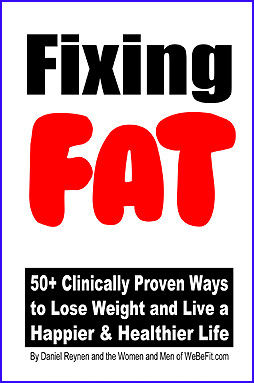Change Your Life, One Small Step at a Time
We're all creatures of habit. The foods we enjoy eating, the clothes we like wearing even the feelings we have every day are heavily influenced by what we've learned as we grow up. If you were raised in an environment where healthy food was the norm and exercise was encouraged, there's a good chance you eat healthy food and you exercise regularly.
However, if you were raised eating foods high in fat and sugar while doing little more than watching TV, years later, you're probably still eating unhealthy foods and avoiding exercise. Changing those bad habits can be extraordinarily difficult. Now researchers have begun to learn why.
It starts with personality. Most character traits can be described using five dimensions. They are Agreeableness, Conscientiousness, Extroversion, Neuroticism and Openness. Personality tests are used to measure and see if people are "high" or "low" on each of the dimensions. For example, someone who scores high on agreeableness is considered friendly and warm. Someone shy or suspicious would get a low score on the agreeableness dimension.
In 2003 Psychologist Sanjay Srivastava and his colleagues assessed the "Big Five" personality traits of more than 130,000 participants aged 21 to 60. What they discovered is that openness, the personality trait linked to a person's willingness to make change, increases modestly in people up to the age of 30. After that, it begins a slow decline.
Things outside our normal range of experience become increasingly less attractive. Brain researcher Gerhard Roth summed it up best when he said, "Holding to the tried and true gives us a feeling of security, safety, and competence while at the same time reducing our fear of the future and of failure."
In other words, we fall into a rut and we're content there, no matter what we say. In fact, the more we insist we can change, the more likely it is we'll ultimately fail. It's called the "false hope syndrome." Here's how it works.
We wake up on New Year's day and resolve that this is the year we're going to start exercising. That's good. The problem happens with the overblown expectations that are developing in the back of our mind. Exercise is good, but thinking that exercise will get us a better job, help us meet our true love or make us more popular is a fantasy.
The reality is, exercise is hard. Even if we work out regularly for a month or two, the rest of our life may stay the same. Facing that disappointment is what causes many people to quit.
So how do people successfully change? Psychologists have identified two primary ways.
The first is through a traumatic event. The death of a loved one, a life-threatening illness, the beginning or end of a relationship, a change in jobs, natural catastrophe or a move are all things that shake people out of their comfort zone. People who survive are able to redefine themselves and make significant changes.
Of course, sitting around waiting for a traumatic event to happen so you can get in shape isn't a plan. (Some events can cause the opposite problem. During pandemics people isolate and put on MORE weight because they can't go out and use common spaces like gyms.)
The second way people successfully change their lives is through small steps. There are just too many habits to break all at once for most people to make a big resolution stick. But if we decide to make only one change, our chances for success rise dramatically. Here's how.
Instead of resolving to eat only healthy food from now on, start small. Promise you'll eat at least two servings of vegetables every day for a month, or you'll walk 15 minutes after dinner, or you'll switch from whole milk to fat-free. Choose one small thing and that's it. It works because we're less likely to pin false hopes of getting the perfect body because we're eating more broccoli.
Then, once each month, choose a new small thing to improve. Over time, all those small changes start to seriously add up. What small change will you make?
UPDATE: This article gave me the incentive to finish writing a book.
The response to this article was more than I expected. For months people emailed, called and messaged me, asking the same question. What small changes can you suggest?
I took hundreds of tips and after eliminating what didn't work, what wasn't proven and the duplicates, I ended up with 54 things you can do to live a healthier and happier life. Many are remarkably simple. Drinking a couple glasses of water before each meal or changing the size of your dinner plate.
I've put them all together in one place, a book titled Fixing Fat. To make it easy as possible, I start each action item with a sentence or two, telling you what to do. That's followed with a few paragraphs telling you how to take action and in some cases, how or why it works. Then I wrap it up with a list of the clinical trial or trials that proved it.
Every suggestion is laid out the same. Action. Details. Proof.
You simply flip through the book, find an action you want to take and concentrate on doing it for the next 30 to 90 days. Once it becomes a habit, open the book and choose the next one. Those simple actions, carried out repeatedly over time, will help YOU achieve your goals, just like they've helped my clients. Click Here to learn more about the book.
Call for a FREE Consultation (305) 296-3434
CAUTION: Check with your doctor before
beginning any diet or exercise program.
1/25/2009
Updated 8/4/18



